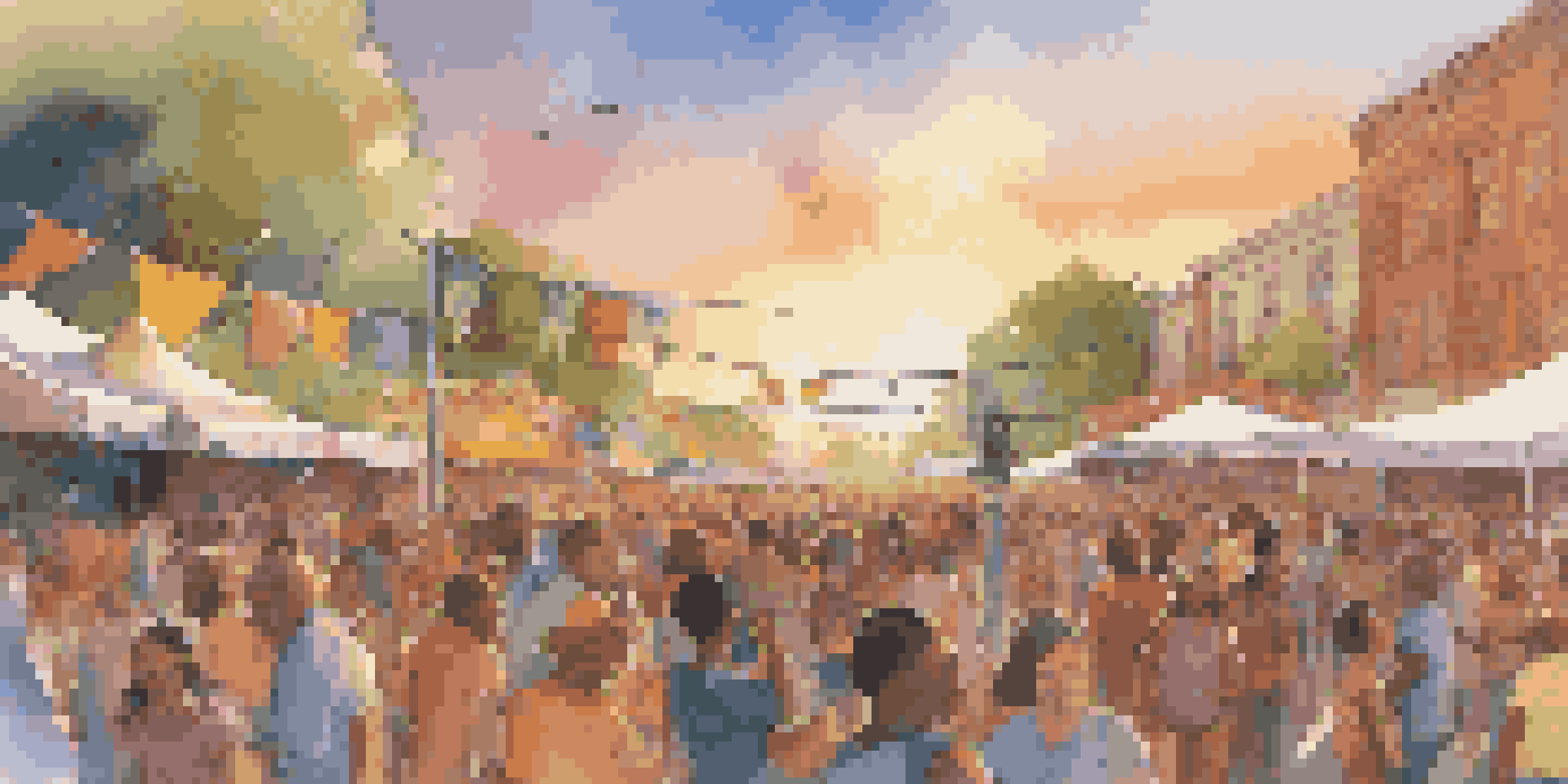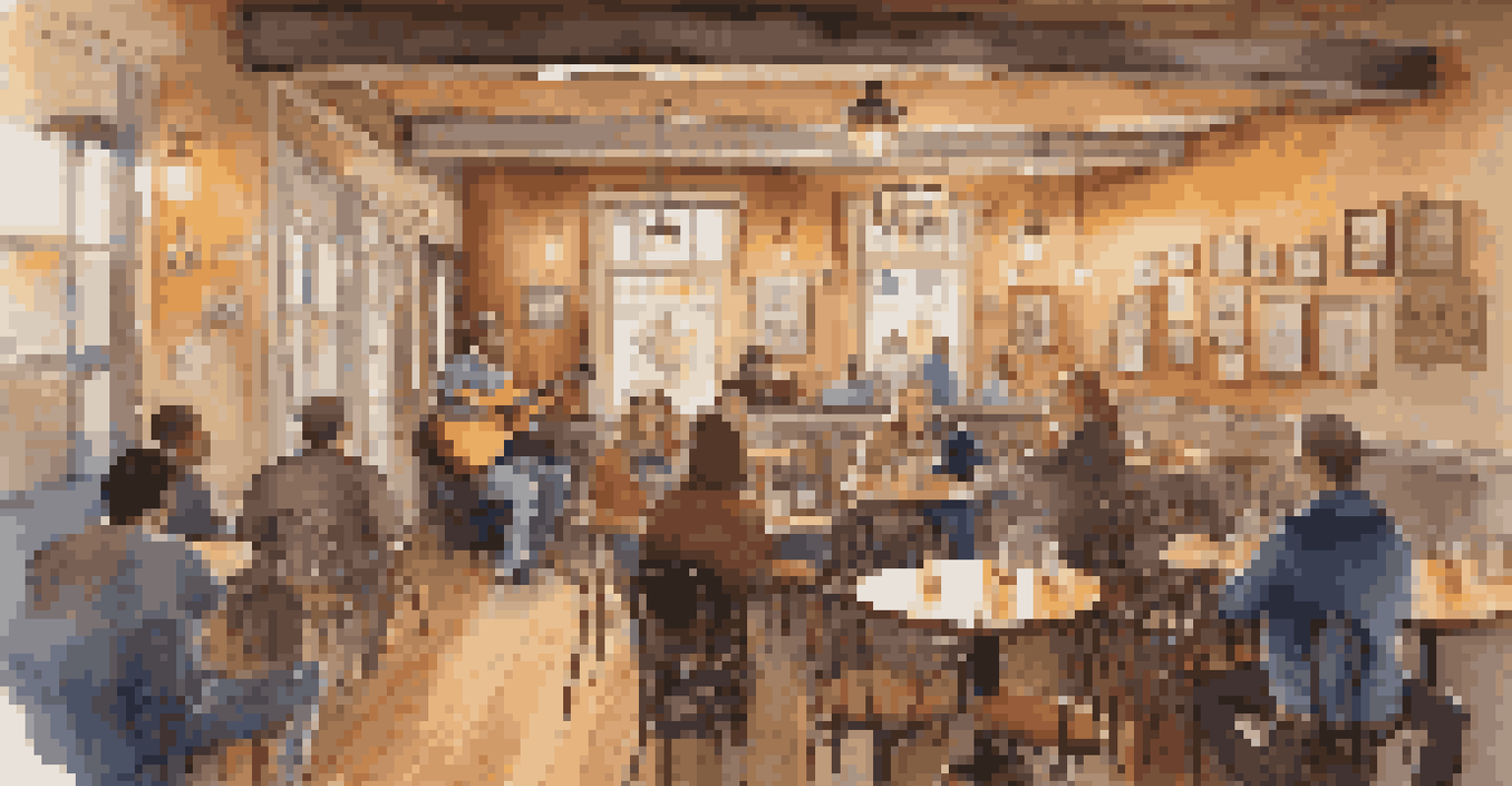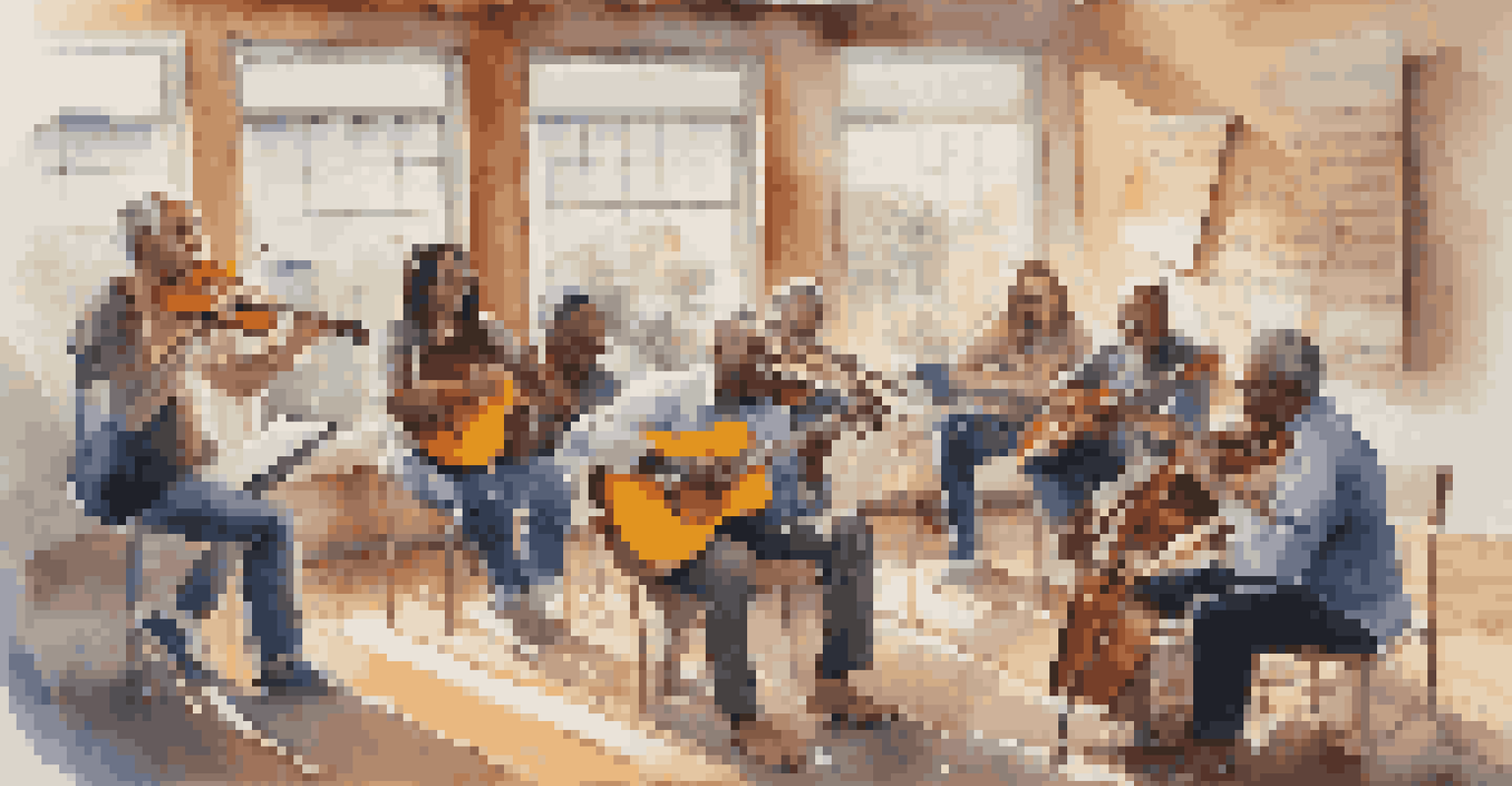Music and Community Development: Fostering Local Economies

The Role of Music in Community Identity and Pride
Music has an incredible ability to shape a community's identity. It often reflects the culture, history, and values of the people who live there. When local musicians share their stories through their songs, it creates a sense of pride and belonging among community members.
Music can change the world because it can change people.
For example, festivals celebrating local artists can draw in visitors, showcasing the region’s unique sound. This not only highlights local talent but also fosters a connection among residents. As people come together to celebrate their shared love for music, they cultivate a stronger community bond.
In this way, music becomes more than just entertainment; it’s a vital thread in the social fabric of a community. By fostering local pride, music can help communities thrive economically and socially, creating a vibrant atmosphere that attracts both residents and tourists alike.
Economic Impact of Music Festivals and Events
Music festivals and events can be powerful economic engines for communities. They attract visitors who spend money on accommodations, food, and local attractions, providing a significant boost to the local economy. This influx of cash can help support small businesses, create jobs, and stimulate growth.

For instance, a small town that hosts an annual music festival might see an increase in hotel bookings and restaurant sales, which can lead to long-term benefits. As businesses thrive, they can invest back into the community, improving infrastructure and services. Over time, this leads to a cycle of economic development that benefits everyone.
Music Shapes Community Identity
Local music reflects the culture and values of a community, fostering pride and a sense of belonging among its members.
Moreover, these events often create opportunities for local artists and musicians to showcase their talents. By providing a platform for local talent, festivals not only contribute to the economy but also empower individuals to pursue their passions, further enriching the community’s cultural landscape.
Local Music as a Catalyst for Social Change
Music has a unique power to inspire social change and unite people around common causes. Community-based music initiatives can address local issues, raise awareness, and mobilize residents. For example, local musicians may come together to create songs that highlight social justice issues, encouraging dialogue and action.
Where words fail, music speaks.
When communities harness the power of music for advocacy, it can lead to tangible changes. Concerts and events that focus on social issues not only entertain but also educate the audience, fostering a sense of responsibility among community members. This creates a culture of engagement and activism, where music serves as a rallying cry for change.
Additionally, by collaborating with local organizations, musicians can amplify their messages and reach broader audiences. This collaboration not only enhances the impact of their efforts but also strengthens community bonds, proving that music can be a powerful tool for social transformation.
Music Education and Youth Empowerment
Music education plays a crucial role in empowering youth and fostering community development. By providing access to music programs, communities can nurture talent and creativity among young people. This not only enriches their lives but also instills valuable skills such as discipline and teamwork.
For example, community centers that offer music lessons or workshops can help young people find their passion and career paths in music. As they gain confidence and skills, they may become involved in local music scenes, contributing to the community’s cultural vibrancy. This engagement can also lead to mentorship opportunities, further enhancing personal and professional growth.
Economic Boost from Music Events
Music festivals and events stimulate local economies by attracting visitors who support small businesses and create jobs.
Moreover, music education can serve as a safe space for expression, allowing youth to explore their identity and emotions. By investing in music education, communities invest in their future, creating a generation of engaged, creative, and empowered individuals who can drive positive change.
Building Networks Through Collaborative Music Projects
Collaborative music projects can foster connections among individuals and organizations within a community. By bringing together diverse groups, these projects can bridge gaps between different demographics and create a sense of unity. For instance, community choirs or bands often include participants from various backgrounds, encouraging collaboration and teamwork.
These connections can lead to lasting relationships and partnerships that extend beyond music. As people work together to create something beautiful, they build trust and understanding, which can translate into other community initiatives. This collaborative spirit can enhance community resilience and foster a culture of mutual support.
Additionally, collaborative projects often engage local businesses and organizations, creating opportunities for sponsorship and support. By working together, communities can leverage resources and expertise, amplifying the impact of their music initiatives and strengthening the local economy.
The Influence of Local Venues on Community Engagement
Local music venues play a vital role in fostering community engagement and cultural exchange. They serve as gathering spaces where people can come together to enjoy live performances and connect with one another. These venues often showcase local talent, creating a sense of ownership and pride among residents.
For example, a small café that hosts open mic nights can become a hub for aspiring musicians and their supporters. This not only gives artists a platform to share their work but also encourages audience participation, creating a lively and supportive atmosphere. As a result, these venues contribute to the overall vibrancy of the community.
Music as a Tool for Social Change
Community music initiatives can inspire social change by uniting people around common causes and raising awareness on important issues.
Moreover, local venues often collaborate with community organizations and schools, further enhancing their impact. By hosting events that promote social causes or support local initiatives, they can engage residents in meaningful ways, fostering a sense of belonging and community spirit.
Harnessing Technology to Amplify Local Music Scenes
In today's digital age, technology has transformed how we experience and promote music. Local musicians can now reach wider audiences through social media and streaming platforms, allowing them to share their music beyond geographic boundaries. This not only helps artists gain recognition but also draws attention to local culture.
For example, a local band that shares their music online may attract fans from different cities, encouraging visitors to attend their live shows. This increased visibility can lead to more opportunities for local musicians, such as collaborations and sponsorships, ultimately benefiting the community’s economy.

Additionally, technology can facilitate community engagement through virtual events and online collaborations. By leveraging digital tools, communities can create inclusive spaces for music appreciation and participation, ensuring that everyone has a chance to be part of the local music scene, regardless of physical location.